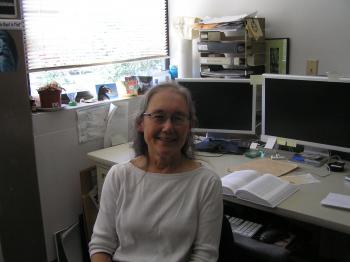Linda Rhodes

Voices from the Science Centers
Voices from the Science Centers is an oral history initiative dedicated to documenting the institutional knowledge of fisheries scientists and administrators in the labs of NOAA’s Fisheries Science Centers.
Linda Rhodes was born in Fort Eustis, Virginia in 1952. Linda moved to the Seattle coast in 1974. She earned her Ph.D. in Molecular and Cell Biology from the University of Washington in 1993. Linda has done work as a histopathologist and zoologist. She began working for the Northwest Fisheries Science Center in 1976 and has been a microbiologist since 2007. She enjoys in her leisure time participating in citizen science projects in her county. As of this interview, Linda lives on Whidbey Island, Washington.
Interview contains discussions of: molecular biology, histopathology, National Marine Fisheries Service, National Oceanic and Atmospheric Administration, Puget Sound, Whidbey Island, government scientists, multidisciplinary research, Pacific Northwest marine ecosystems, ecotoxicology, citizen science, bull kelp, infectious diseases in fish, bacteria, hyporheic zone, respiratory bacteria in killer whales, women in research science and environmental DNA.
Linda describes in this interview the challenges of government science with specific attention to issues surrounding the importance of microbiology. She describes the path of her education and career with the Northwest Fisheries Science Center in Seattle, Washington.
Please Note: The oral histories in this collection are protected by copyright and have been created for educational, research and personal use as described by the Fair Use Doctrine in the U.S. Copyright law. Please reach out Voices@noaa.gov to let us know how these interviews are being used in your research, project, exhibit, etc. The Voices staff can help provide other useful resources related to your inquiry.
The NOAA mission is to understand and predict changes in climate, weather, oceans, and coasts, to share that knowledge and information with others, and to conserve and manage coastal and marine ecosystems and resources. The Voices Oral History Archives offers public access to a wide range of accounts, including historical materials that are products of their particular times, and may contain offensive language or negative stereotypes.
Voices Oral History Archives does not verify the accuracy of materials submitted to us. The opinions expressed in the interviews are those of the interviewee only. The interviews here have been made available to the public only after the interviewer has confirmed that they have obtained consent.
